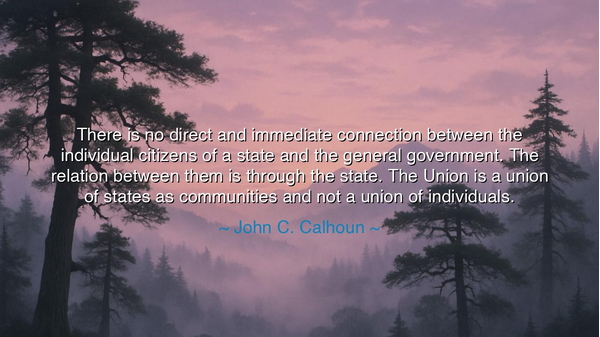
There is no direct and immediate connection between the
There is no direct and immediate connection between the individual citizens of a state and the general government. The relation between them is through the state. The Union is a union of states as communities and not a union of individuals.






"There is no direct and immediate connection between the individual citizens of a state and the general government. The relation between them is through the state. The Union is a union of states as communities and not a union of individuals." — John C. Calhoun
In these solemn words, John C. Calhoun speaks as one who peers into the deep architecture of nations — the sacred order that binds men into communities, and communities into a Union. His voice is not that of a mere politician but of a philosopher of government, tracing the invisible cords that hold a republic together. He declares that the Union is not born of individuals acting alone, but of states, which are themselves living organisms — ancient, proud, and self-governing. To understand him, we must step back into a time when men thought of the state not as a mere convenience but as a guardian of liberty, a hearth of law, and a vessel of the people’s will.
In the early days of the American republic, the states were the first homes of sovereignty. Each one, from Virginia to Massachusetts, existed before the federal union came into being. The Constitution was their pact — their solemn covenant — through which they lent part of their authority to create a general government, a structure meant to serve, not to dominate. Thus, when Calhoun speaks of the relation between citizen and government passing “through the state,” he reminds us that individuals are not naked before the vast power of the Union; their shield and interpreter is their state, their community writ large.
But the meaning goes beyond mere legal form. Calhoun’s vision touches the very soul of political belonging. He feared that if men came to see themselves only as individuals before an all-powerful central authority, they would forget the sacred bonds of fellowship — the smaller circles of loyalty that give life to liberty. For liberty cannot thrive in isolation; it is nurtured by community, by those smaller bodies that give each person a voice that might otherwise be lost in the crowd. In this way, the state is the voice of the people, and the Union the harmony of many voices — not the silence of one command.
Consider the tale of Ancient Greece, where city-states like Athens and Sparta stood as proud exemplars of self-rule. When these communities formed leagues for mutual defense, they did not surrender their souls to a central power. Their alliances were fragile, yes — but they preserved their dignity and freedom as distinct peoples. When, in time, the leagues collapsed under the weight of ambition and domination, it was not the might of their armies that failed, but the balance between unity and independence. Calhoun’s warning echoes this ancient lesson: that a union of free communities must be a harmony of equals, not a chain binding slaves to a master.
History itself offers proof in the American story. During the great Nullification Crisis of the 1830s, Calhoun stood as a prophet of state sovereignty, proclaiming that each state retained the right to guard its people against federal overreach. Though his cause was contentious and his motives questioned, his words sought to defend a principle: that the general government derives its power not from the individual, but from the consent of the states united in covenant. Whether one agrees or not with his methods, the underlying truth remains — that liberty requires limits on every throne, even the throne of the majority.
Yet Calhoun’s teaching is not merely political; it is moral. It reminds us that identity and duty flow first through the smaller circles of life — our families, our towns, our communities — before they reach the greater whole. The man who serves his village faithfully strengthens his nation more than the man who seeks glory in abstraction. The woman who defends her local justice, her school, her neighbor’s right, defends the republic itself. For the nation is only as sound as the virtue of its parts.
So, dear listener and reader, take from this not a call to division, but a call to balance. Cherish the small communities that give you roots — your state, your town, your circle of kindred souls — for they are the bridge between your heart and the great machinery of government. Let not the immense and distant power of nations make you forget the near and the tangible bonds of home. Serve your community, that the Union may endure. Defend your state’s honor, that the republic may remain free. And remember always that a people without strong local loyalties soon become a crowd — and crowds, when severed from their roots, are easily ruled.
Lesson: A true and enduring union — whether of states or souls — is not born from the destruction of individuality, but from the harmony of many free communities.
Practical Action: Strengthen the bonds of your local life. Know your neighbors. Defend your local institutions. Engage in civic duty not merely as a citizen of a vast nation, but as a child of your community. For from such roots, the grandest trees of liberty rise.






AAdministratorAdministrator
Welcome, honored guests. Please leave a comment, we will respond soon